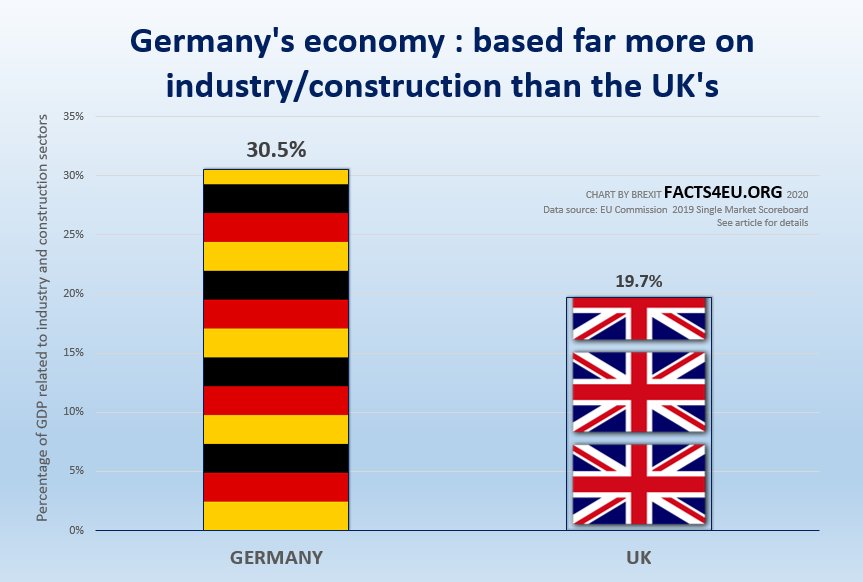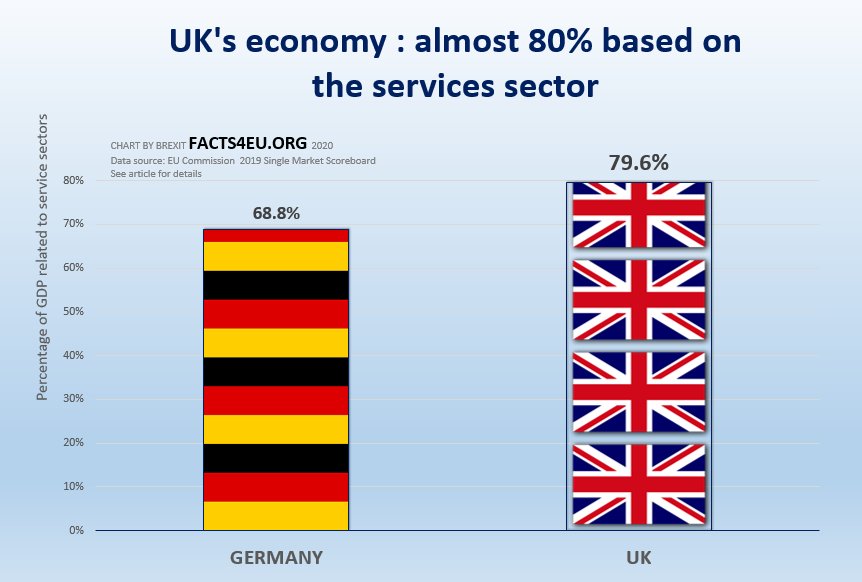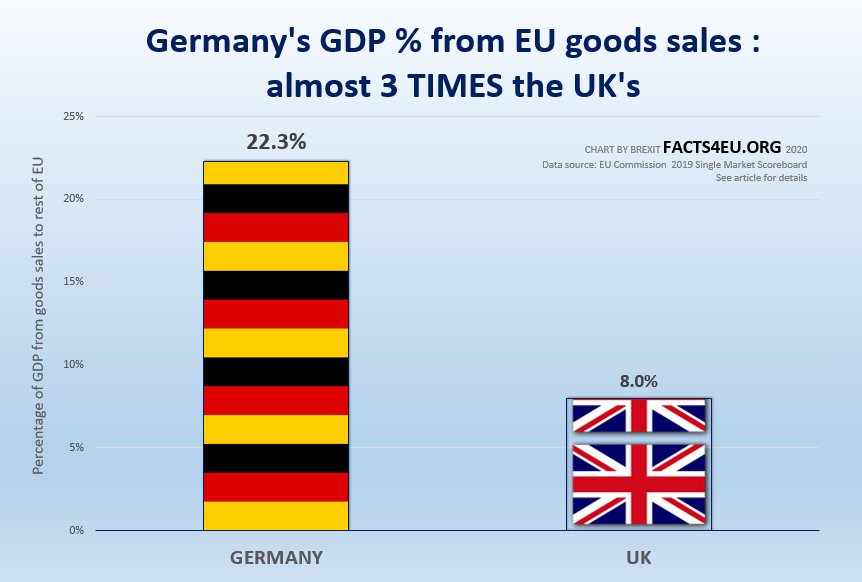The real reason Germany got rich from the EU and the UK didn’t
A fascinating look at the EU’s latest figures

© Brexit Facts4EU.Org
“You don’t need to speak German to buy a Bosch”
One EU country – Germany – now represents 25% of the total EU27 economy. How did it get so large?
In this simple but unusual Brexit Facts4EU.Org report, we look at the absolute basics of the UK and German economies. In particular we consider the question:
Why has Germany got so rich from the EU, but the UK has not?
(If you are an economist you might want to look away now.)
A recent publication from the EU Commission’s statistics agency listed the latest breakdowns of EU member state economies by sector. Below we show the massive difference between Germany and the UK, when the respective economies are broken down into the services and the industry/construction sectors.
Brexit Facts4EU.Org Summary
Why Germany won the economic war in the EU
- Germany’s economy is 50% more reliant on industry than the UK’s economy
- Industry represents 30.5% of the German economy
- In the UK, industry represents just 19.7% of the economy
© Brexit Facts4EU.Org - click to enlarge
The natural corollary of the above is that
the situation is vastly different for the service sector of each country’s economy.
- Almost 80% of the UK economy is related to the service sector
- For Germany, the service sector represents only 68.8%
© Brexit Facts4EU.Org - click to enlarge
In the case of agriculture, this is broadly similar for both countries, standing at 0.7% for the UK and 0.9% for Germany.
Germany’s captive and protected market
The EU has given Germany’s industrial machine some considerable advantages. Since the creation of the Customs Union, Germany has been able to sell its industrial output to its neighbours without tariffs. The creation of the Single Market also meant that common product standards could be applied.
Furthermore, Germany’s products have been protected from the competition of cheaper imports by the tariffs the EU imposes on products from other countries around the world.
In addition to this, the establishment of a common currency (the Euro) in 1999 has had the effect of keeping German prices lower than they might otherwise have been.
How Germany now dominates goods sales in the EU
Our final chart is perhaps the most dramatic of all. It shows, using official EU data as ever, just how much Germany has been able to build its economic success by selling to the rest of the EU.
Brexit Facts4EU.Org Summary
Germany’s economy has been helped dramatically by its goods sales to the EU
Data from EU Commission, Single Market Scoreboard, 2019
- 22.3% of German GDP was due to goods exports to the rest of the EU (including the UK)
- 8.0% of UK GDP was due to goods exports to the rest of the EU (including Germany)
© Brexit Facts4EU.Org - click to enlarge
Hasn’t the UK benefited too?
It is of course true that in theory the UK was also able to benefit from the Customs Union and Single Market. There are, however, a couple of major differences.
Firstly, as we have demonstrated above, Germany’s economy is slanted much more towards goods than services. Sadly – and as we have reported many times – the EU itself admits that the Single Market does not work for services. This massively handicapped the United Kingdom.
It must also be said that the provision of some services is more reliant on the seller and buyer speaking the same language. It is a simple fact that you don’t need to speak German to buy or use a Bosch washing machine or cordless screwdriver.
Whatever the reasons, one thing is for sure
The EU has benefited the German economy far more than it is has the UK’s economy – and it has done so for decades. We will leave readers with one final statement from the EU Commission.
Official: UK benefits least from the Single Market, out of all 28 EU members
“The UK is the Member State with the lowest trade integration in the Single Market for goods”
- EU Commission, Single Market Scoreboard
Observations
“We’ve left haven’t we? Why is any of this relevant?”
(Typical comment we get from Remoaners on social media.)
The United Kingdom is still in the EU’s Single Market and the Customs Union. The EU is playing hardball – as one would expect – in the current trade negotiations with the UK.
We think that British negotiators need to remember the basic facts before the start of each round of negotiations. The rest of the EU – and Germany in particular – has done very nicely thank you out of the UK’s membership of the European Union in the last 47 years.
Let’s not forget that.
Finally, would you mind if we made an appeal for your support? We have no corporate sponsors. Since before the EU Referendum we have relied on you to be generous.
We do not sit behind a paywall – you can read our well-researched and factual reports each week for free.
In the last four years - since before the Referendum -
we have researched and published more than any other Brexit organisation
Hundreds of thousands of people read our work. Please become one of the very few who decides to support freedom of speech with a donation to us today. You will receive a personal ‘thank you’ email from a member of our team.
Making a donation is quick, simple, and secure, and you can choose one of the links below this article. Thank you so much.
[ Sources: EU Commission Single Market Scoreboard 2019 | Destatis (official German Government statistics agency) | HMRC | Eurostat - official EU statistics agency] Politicians and journalists can contact us for details, as ever.
Brexit Facts4EU.Org, Tues 10 Mar 2020
Click here to go to our news headlines
And please scroll down to COMMENT on the above article.
Since before the EU Referendum, Brexit Facts4EU.Org
has been the most prolific researcher and publisher of Brexit facts in the world.
Supported by MPs, MEPs, & other groups, our work has impact.
We think facts matter. Please donate today, so that we can continue to ensure a clean Brexit is finally delivered.
Paypal Users Only - Choose amount first
Quick One-off
Monthly





Something to say about this? Scroll down for reader comments